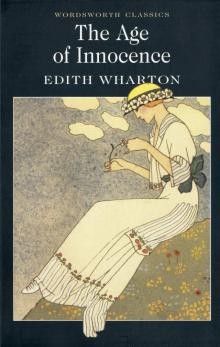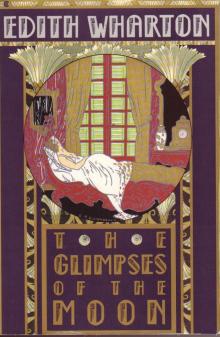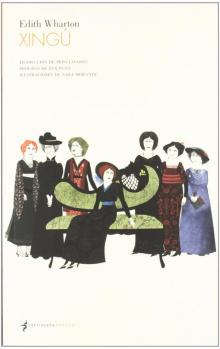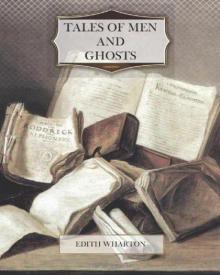- Home
- Edith Wharton
The 2014 Halloween Horrors Megapack Page 13
The 2014 Halloween Horrors Megapack Read online
Page 13
Mora had taken Gwendolyn’s hand and squeezed it.
“I’m afraid I’ll like it, Mr. Thomas!” she said huskily. “I hate to go so far away—and I can probably afford whatever she asks. If I think I’m leaving Gwen in an extra special place, it will make me feel that much better about it.”
Mr. Thomas’ benevolent blue eyes beamed through thick lensed glasses. Men always beamed at Mom, though she didn’t notice them much as a rule. Mom had fluffy dark hair, short, like Gwen’s; very, very dark blue eyes—like Gwen’s again. A heart shaped face and a pale pink skin without much make-up except lipstick. Mom’s lips had to be red, of course, where brightish pink looked good on a little girl.
So Mom and Gwen had driven out together to this pretty, woodsy place with the brown shingle house that looked like a doll’s house with gingerbread iron porch rails and other trimmings, and had made the deal. And this time, coming back—but Mom had had her luggage sent out last evening, when they meant to come together and went to a movie instead—Mom had just time enough at the end to let Gwen out at the gate and make the train that connected with her New York liner.
It was all right. Miss Haggety was expecting Gwen.
Just before the pretty brown house came in sight the woodsy path grew almost dusky, thought it was mid-afternoon. A dark cloud must be passing overhead. Gwen caught glimpses of little bright eyes peeping out of some of the bushes, and hoped they belonged to squirrels. She liked squirrels—and was a little suspicious of animals she wasn’t acquainted with. Maybe there were some dogs or cats around. Maybe—
She sighted the house, coming round the last bend in the path. It looked alone and quiet, almost as though nobody lived in it. Where were the other children? Miss Haggety had told Mom they were in bed the other night, had let Mom go upstairs and peep into a room where several lay asleep. She put them to bed rather early, Gwendolyn thought; but maybe those children were much younger than she was. At nine, you didn’t go to bed until nine; just as, at eight, you had stayed up till eight!
Well, she would insist on that! Miss Haggety would want to please Mom, on account of the rather high price. And if she did so much good, Gwen was glad the price was high enough so that she could do it. As to bedtime, though, Gwendolyn intended to be firm, and stand on her reasonable rights.
She stood looking at the house, and even here in the clearing the air was dark. The high up cloud seemed to have settled down on the earth and made itself into a fog. The brown shingles were dull and blackish, and not so very pretty after all.
Nervously, Gwen’s right hand went up to the new locket Mom had given her, a gold heart with an amethyst cross set in the center; nervously she twisted it on the chain.
Then she took her hand away, feeling babyish to stand there turning it round and round on her neck—but all at once the fog had cleared and the cloud lifted, and the sunlight slanted down into the clearing and the brown shingles fairly shone in it.
“Pretty, pretty little gingerbread house!” Gwen said to herself. “Like the brown gingerbread house in the woods in Hansel and Gretel!”
Then she wished she hadn’t thought of that! Who lived in the gingerbread house but a witch? A very dreadful, hypocritical witch, who had a house made of real gingerbread and let hungry children nibble happily at it—and then caught them and fattened them up nicely and afterward ate the children!
“It’s my imagination, again,” Gwendolyn told herself judicially. “It goes with being talented in writing, as I am for my age. I’ve even more imagination than Mom, because she reports for a paper, and she says I’ll end by writing shelves full of novels. But you mustn’t let your imagination run away with you, not ever!”
She walked firmly up the three steps made beautifully of rough gray stone, crossed the rather narrow porch, and put her hand on the shiny brass knocker. A spider spun suddenly down from somewhere on a heavy, ropy web-thread, landed right beside the knocker and started coming fast at Gwendolyn’s hand. She made a frantic gesture, jerking away and brushing at it at one and the same time—Gwendolyn did not like spiders, and this one was huge and ugly, dark gray with huge hairy legs and the meanest bright eyes—
And she didn’t mean to hit it, because she didn’t want even to touch it. But hit it she did and it fell down dead. And she hadn’t managed to rap with the knocker, but the door swung inward just then, and there stood Miss Haggety, looking down at the spider even before she looked at Gwen’s face.
Tall and gray like the spider Miss Haggety stood there, and her face was not kind as Gwen was sure it had been the other night when Mom was along. Her hair was done in corkscrew ringlets like then, and her black dress was very neat, but she was awfully tall and her frown was awfully deep.
“Little girl, I love all the living things around my house,” she said slowly, in a deep, deep voice. “All the little creeping things, as well as the ones that fly or walk or run. Haven’t you been taught that spiders and snakes and frogs and toads are all good and useful, and mustn’t be killed or even hurt? If your mother hasn’t taught you that, then I shall begin to do it.
“You are Gwendolyn Jones, and I don’t care for common names or Welsh names either. So I’m going to call you Gretchen, I think, and of course we won’t have to use your last name here—Gretchen!”
“You act like a witch, and Gretchen is nearly Gretel, and why don’t you call me Gretel and be done with it?” Gwendolyn thought darkly. But of course she didn’t say it, and Miss Haggety’s eyes strayed up and down over her, over her little green shoes and her new green dress, and ended staring thoughtfully at the amethyst locket.
“I don’t like amethysts either, and jewelry is unsuitable for a child, and besides your wearing it might hurt the other children’s feeling,” Miss Haggety announced. “Here, give it to me. You can have it back—when you are going.”
The long, skinny hand with warts on the fingers was right under Gwendolyn’s nose. The bitter black eyes regarded her. Something like a smile of triumph lighted them when Gwen unfastened the chain and laid the locket in the ugly hand. Why hadn’t she noticed Miss Haggety’s hands the other night?
If she had, she would have told Mom she didn’t want to stay here, and Mom would have found another place even if she missed the liner!
Miss Haggety plucked the locket out of her palm, taking the chain gingerly between the first finger and thumb of her left hand and holding it away from her as though it smelled badly. She really didn’t like amethysts! Gwen’s wonder at that gave her something to think about beside her grief at giving her locket up, and her anger. It hurts to be angry when there is nothing you can do about it.
Gwen had a hurting feeling she had never known about. Was it fear? Not quite, perhaps. But an awful sense of helplessness.
What could you do when you were only nine and something turned out all wrong, and your mother was out of reach and you couldn’t tell her?
How could you leave a place where you had been left by the dearest person in the world, your board all prepaid for months, your only relative beside the one who was gone so far a quite ill aunt?
How did you mail a letter from this place? Did Miss Haggety read the letters you might write, and see if they suited her?
“Come and meet the children,” Miss Haggety said.
In a black, stubborn, hating obedience she had never felt before, Gwen followed Miss Haggety into her house. (I am not, Gretchen, I am not!)
How dark, now dingy the walls—and spider webs hung in the ceiling corners. No doubt the spiders mustn’t be disturbed. It was like an old ghost house, a haunted house! The daylight filtered feebly past close growing shrubbery that crowded the dirty windows. Last evening Gwen and Mummie had been shown into a room lit with shaded lamps, and it had looked so different. Was that only because of the soft lamplight?
There was nothing to do now but wait for dinner time. There was nothing to play with. A few books for children were piled on a dusty table, but they were for younger children and not very interesting
. Gwen turned the pages languidly. The old walls seemed to hold a chill that made her not quite shiver, but want to draw herself into a small, huddled ball.
She slid down from the deep chair joyfully, when a black cat came sidling into the room. But she drew her hand back quicker than she had stretched it out. The cat was a mean, ugly looking cat, with a green-yellow glare in its eyes and teeth that showed a little between its lips. It was a sneering cat, a cat that wouldn’t make a friend, that would probably bite and scratch. A Grimalkin cat, whatever that was! The cat sat down and watched Gwen, and she tried not to see it.
How did you make the hours pass in this place? But Gwen thought she began to see the answer. The hours would hold no fun, no happiness, and they would be long and slow—but she would sink into a numb not-caringness. Already the pale light shifted on the floor. Dinner would be early because of the littler children, probably. After dinner? More dull hours and bed. And after all, it wouldn’t matter about staying up till nine—it wouldn’t matter at all.
A colored servant came after a long time to take Gwen in to dinner. She had cooked the meal, for her gray unaproned dress had food stains on it. So she was probably Miss Haggety’s maid-of-all-work, Gwen thought.
“You’ll watch the time for yourself after today, Miss,” the woman said, looking at Gwen as though she were a thing, and not a person. “There’s an old grandfather clock in the back hallway. If you’re out of doors, you can watch the time of day by the sun. We don’t pamper children here. But if you have to speak to me, they call me Sal.”
Not hungry, Gwen walked beside the woman into the dining room. Through swing doors, Sal passed on to the kitchen. Gwen watched her disappearing back. Her face was a dark face, darker than a white person’s, and as the kitchen door swung back she caught a glimpse of a tall black man. But they did not look like the colored people Gwen had known, neither of them. Their features were sharply cut, what people called aquiline. The man was much the darker—his skin was really sooty black! But they somehow looked alike. They looked like people who might be half Indian and half Negro, and then partly another thing that made them hard and cold and cross—but the worst was the coldness, they didn’t think you were human, or care, either of them. That was what she read in their faces, at least. Or maybe—they didn’t think they were human. They were, of course; but perhaps they would rather not be. What could you want to be if you wanted a thing like that? Something that hurt and punished when nothing had been done that was bad or wrong. Something that punished most when you tried to be the rightest?
Gwen sat down alone at a long table, and did not want to think. Where were her thoughts coming from? If she told them to Mummie, Mummie would take her on her lap like the littler girl she used to be, and say—“What an imagination! Lots of imagination is a good thing, but don’t let it run away with you.”
Only—thoughts like these new ones, Gwen never had had before. And Mummie—when would she see her again? Not for a long time. She had known that; but now the wonder was different. Not when would she see Mummie; but—would she see Mummie again?
That was the worst thought of all.
Miss Haggety came, bringing the children. And it was like having the black wild looking cat come into the other room.
A boy helped Miss Haggety, leading a toddler by the hand and carrying a smaller one, and Miss Haggety bringing two more in the same way. The children would be between two and three years old, Gwen thought, and no company. But, even before dinner, they were all half asleep. If she were allowed to play with them, she somehow knew they couldn’t play with her. And the boy? There was no talk as they went into the dining room.
As the soup was served, warm, rich and nourishing, Gwen studied the boy. He was about her age, maybe a year older, and he was very handsome. Black haired and dark blue eyed, Gwen liked blond people, and this boy was golden blond. His eyes were a very clear, sweet blue, she thought; but—they didn’t seem to see her.
Yet he wasn’t like the younger children, who seemed half asleep and dopey. It was just, Gwen thought, that for a very long time he had had no one to notice, or to notice him. Maybe she could change that—if Miss Haggety didn’t know or didn’t care. And the first little hope raised its head in her drooping heart. She suspected—it was barely possible—that actually Miss Haggety did not care much what you did in this dismal place. So long as you got on with her ugly pets. So long as you did not try to run away—the penalty for that, the child was sure, would be swift and awful.
So long as you weren’t actually doped! Could you avoid being that? For Gwen, at nine, was not too young to have heard of sleeping medicines and soothing syrup. Being older, and not likely to cry or make a fuss, if she seemed obedient enough, Miss Haggety might leave her like the blond boy. Just ignored and going more and more into herself, until—
Until—what? Would she be here when Mummie came for her? Here, to tell Mum what it was really like at Miss Haggety’s home for children?
The meal, though, continued to be good. After soup a thick slab of juicy, rare roast beef. Lots of vegetables cooked to a turn with nothing soggy or tasteless, steamed or boiled to death, or warmed over. Luscious tossed salad, with really young, tender carrots finely ground, but no onion, which Gwen regretted. For dessert, ice cream with fruit topping.
The boy and Miss Haggety and Sal all helped spoon into the younger children’s mouths a pasty mess they called “liver soup.”
Gwen’s bubbling vitality returned to her, and after dinner she asked Miss Haggety about the nine o‘clock bedtime.
“I don’t care in the least!” that lady said, almost pleasantly. “A child put to bed against its will is as likely to go sneaking around the house as a child let stay up later. If you turn out to be a nosey, prowling, little creature, we will just let nature take her course with you. You’ll find this quiet place so relaxing that after a while you’ll do nothing but sleep! If you give me nothing to complain of—keep the hours you are used to.”
This was a triumph of a sort; but the dismal living room showed no coziness after the lights were lit. Poking around ever so little, Gwen found that the shaded lamps held bulbs of different colors. Gwen could hear heavy footsteps overhead—the two women, Miss Haggety and Sal were trudging about she supposed, putting the half asleep babies to bed. She tried experiments with the different lights; by turning out the ones that were on, and switching on rose colored and amber bulbs, she brought back last night’s pleasant look to the room. But she didn’t dare leave it the way Miss Haggety fixed it for visitors, but had to put back the blue and green and violet lights, and then the room fell in on her in places and loomed away into emptiness in other spots. Her own hands looked greenish and dead. And she could see tiny points of light like gleaming eyes where she knew the spider webs hung, and she knew that the creatures whose houses the grey webs were, hung watching her every move.
So she would have gone up to her own room before the old clock struck nine hollow strokes; but she hadn’t been shown it yet, and must wait for Miss Haggety. Miss Haggety, though, had spoken pleasantly to her after dinner. And the Gwen who had always lived happily seemed to argue with the Gwen who was so lonely and frightened, telling her to make up to Miss Haggety, be nice to her, tell her things that she wanted, and maybe things would turn out better than they seemed.
On the first stroke of nine, Miss Haggety walked into the room, and there was a sparkle in her deep-set eyes like the sparkle of the tiny eyes in the spiders’ web castles.
“I’ll show you your room, little girl,” she said, “A dear friend is calling on me soon, the doctor who takes care of all you little children. So I’ll settle you in first.”
She escorted her up the stairs and opened the door to a room, and there inside were Gwen’s night thing lying on a clean, white narrow bed, and Gwen’s slippers beside the bed ready for her feet.
“Sal hung your clothes in the closet, and you’ll please keep them hung up and tidy.” Miss Haggety said. “You know where the bath
room is, and there’s another door to your room, you see, and two windows for plenty of air. We want our children healthy and strong! That you’ll see. That other door opens into the room of the boy you saw at dinner. We call him Hans, because I like the name. I always thought some day we’d get a nice little Gretel for him to play with! I’m afraid you’ll find him very stupid. You’re a bright child, I can see. There are no locks on any of our doors, but you’re a big girl and you know that you and Hans mustn’t traipse back and forth from room to room. Hans is a sound sleeper, and I hope you’ll be the same. I’ve tested him—I’ve called him in the night, and never got an answer. He probably uses up what brains he has doing his little chores during the daytime. I’ve kept him here for nothing since he was ever so little. Hans is an orphan, you see, though his mother brought him to me before she—before—”
The woman stood still, her mouth a little bit open, the hard lines running back from the corners of it. She had stopped right in the middle of something. Gwen’s spine was cold and creepy again, because of what the old woman had said about Hans and Gretel. Now it wasn’t even Gretchen, Gretel out and out, and that sort of joke was a horrible one for a strange, frightened child, and it would be a very nasty old woman indeed who would nickname a little boy so, and plan to call any unlucky little girl who came along by the name of the other child who was to have been eaten by a witch.
But the braver, happier Gwen took over, and prompted her next words.
“What was Hans’ name—in the beginning?” she wanted to know.
“Arthur. A name I hate!” the old woman said briefly. Then—“I’ll tell you why I didn’t like your name, young lady! There are old superstitions about the Welsh. They’re supposed to have what used to be called second sight—they see things people aren’t meant to see. That sort of thing is only for those who know how to use it. And a long time ago, people believed that amethysts had some silly, magic powers—and I don’t like things that have been connected with that kind of superstition. We have to have some order in the Universe—just as night has to be black. You can see that, can’t you?

 The Age of Innocence
The Age of Innocence The Reef
The Reef Summer
Summer The Glimpses of the Moon
The Glimpses of the Moon Xingu
Xingu The Fruit of the Tree
The Fruit of the Tree Fast and Loose
Fast and Loose Artemis to Actaeon and Other Verse
Artemis to Actaeon and Other Verse The Line of Least Resistance
The Line of Least Resistance The Lamp of Psyche
The Lamp of Psyche The Reckoning
The Reckoning Afterward
Afterward The New York Stories of Edith Wharton
The New York Stories of Edith Wharton The 2014 Halloween Horrors Megapack
The 2014 Halloween Horrors Megapack 'Copy': A Dialogue
'Copy': A Dialogue The Recovery
The Recovery The Fulness of Life
The Fulness of Life Early Short Stories Vol. 1
Early Short Stories Vol. 1 Tales of Men and Ghosts
Tales of Men and Ghosts The House of the Dead Hand
The House of the Dead Hand That Good May Come
That Good May Come The Buccaneers
The Buccaneers Other Times, Other Manners
Other Times, Other Manners The Hermit and the Wild Woman
The Hermit and the Wild Woman Kerfol
Kerfol The Duchess at Prayer
The Duchess at Prayer Bunner Sisters
Bunner Sisters The Choice
The Choice Madame De Treymes
Madame De Treymes Ethan Frome, Summer, Bunner Sisters
Ethan Frome, Summer, Bunner Sisters In Morocco
In Morocco The Valley of Decision
The Valley of Decision Age of Innocence (Barnes & Noble Classics Series)
Age of Innocence (Barnes & Noble Classics Series) The Angel at the Grave
The Angel at the Grave April Showers
April Showers Sanctuary
Sanctuary The Bunner Sisters
The Bunner Sisters Mrs. Manstey's View
Mrs. Manstey's View Writing a War Story
Writing a War Story The Custom of the Country
The Custom of the Country In Trust
In Trust The Triumph of the Night
The Triumph of the Night The Hermit and the Wild Woman, and Other Stories
The Hermit and the Wild Woman, and Other Stories Roman Fever and Other Stories
Roman Fever and Other Stories The Mission of Jane
The Mission of Jane The Descent of Man and Other Stories
The Descent of Man and Other Stories Coming Home
Coming Home The Touchstone
The Touchstone Early Short Stories Vol. 2
Early Short Stories Vol. 2 Edith Wharton's Verse, 1879-1919, from various journals.
Edith Wharton's Verse, 1879-1919, from various journals.